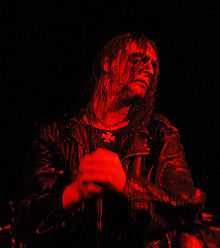Daniel Rostén
| Daniel Rostén | |
|---|---|
 Mortuus in Arnhem, 2007 | |
| Background information | |
| Birth name | Daniel Rostén |
| Also known as | Arioch, Mortuus |
| Born | April 26, 1977 |
| Genres | Black metal |
| Occupations | Musician |
| Instruments | Vocals, guitar, bass |
| Years active | since 1994 |
| Labels | Century Media, Norma Evangelium Diaboli |
| Associated acts | Marduk, Funeral Mist, Triumphator |
Daniel Rostén is a Swedish black metal vocalist, guitarist, and bassist, known as the frontman for Funeral Mist and singer/guitarist of Triumphator under the stage name Arioch, and for having been the vocalist for renowned Swedish black metal band Marduk since 2004 under the stage name Mortuus.[1] He also runs a graphic design company called Holy Poison Design.
Biography
Early years (1994-2004)
Arioch joined Funeral Mist as bassist in the summer of 1994, before the band's first demo recordings. He leads the band since all old members left, and recorded the second demo Havoc in summer/autumn 1996 with the new drummer Necromorbus (Tore Stjerna).[2] Arioch also played guitar and sung in Triumphator in the 1990s and contributed the lyrics to the French band Antaeus' song Sanctus, released on De principii evangelikum in 2002.
Marduk (2004 onward)
In 2004, Rostén joined Marduk as vocalist prior to the completion of the band's album Plague Angel, replacing longtime vocalist Legion. Marduk's founder and guitarist Morgan Håkansson had contributed the lyrics to the Triumphator song Heralds of Pestilence. Mortuus introduced a decidedly distinct and different vocal style to Marduk to that of his predecessor, and it was due to his credentials as vocalist in Funeral Mist that Håkansson contacted Rostén by telephone. After careful consideration Rostén accepted Håkansson's offer to join Marduk. In contrast to Legion, Håkansson has stated that Rostén has shared his interest in enthusiasm for Marduk's lyrical content, which has notably consisted of subject matter such as Biblical tales, Third Reich history and World War II.[3]
In 2012, Mortuus also sang on Merrimack's album The Acausal Mass, as the band's member Perversifier stated after Rock Hard journalist Jan Jaedike compared some of Merrimack's material to "the least comfortable stuff of Marduk with Mortuus". He was not mentioned in the album's booklet though because Merrimack did not want to use his name for promotion.[4]
Controversy
In December 2009 Rostén, while performing live at the DNA Lounge in San Francisco was approached on stage by a drunk, shirtless fan who attempted to hug him. Rostén grabbed the man by the head, flipped him over onto his back on the stage, and pushed him off it.[5] This incident was recorded on video and was subject to mixed reception from observers.[6]
Views on black metal
Arioch points out that "A band that claims to play Black Metal must always have Satanism and nothing but Satanism as the highest priority in their music and concept as well as in their personal lives" and that neither the voice, nor the sound and musical style make a black metal band.[2] He considers "[d]estructive Satanism and fanatic Devil worship" to be "the very foundation of everything labelled 'Black Metal'".[7]
| Look up mortuus in Wiktionary, the free dictionary. |
Discography
With Funeral Mist
- see Funeral Mist#Discography
With Triumphator
- see Triumphator (band)#Discography
With Antaeus
- De principii evangelikum (lyrics for Sanctus, 2002)
With Marduk
- Plague Angel (2004)
- Deathmarch (2004)
- Warschau (2006)
- Rom 5:12 (2007)
- Wormwood (2009)
- Iron Dawn (2011)
- Serpent Sermon (2012)
With Merrimack
- The Acausal Mass (guest vocals, 2012)[4]
References
- ↑ Marduk band timeline
- ↑ 2.0 2.1 Dr. Rape: Funeral Mist. In: Jon Kristiansen: Metalion: The Slayer Mag Diaries. Brooklyn, NY: Bazillion Points Books 2011, p. 420f.
- ↑ Marduk Interview (Morgan & Mortuus)
- ↑ 4.0 4.1 Jan Jaedike: Merrimack. Appetite for Destruction. In: Rock Hard, no. 302, July 2012, p. 62.
- ↑ MARDUK Frontman Vs. Fan, 9 December 2009
- ↑ Marduk Live at The DNA Lounge, 7 December 2009
- ↑ Funeral Mist. In: Slayer, no. 20, Blood Fire Death, 2010, p. 88f.
| |||||||||||||||||||||||